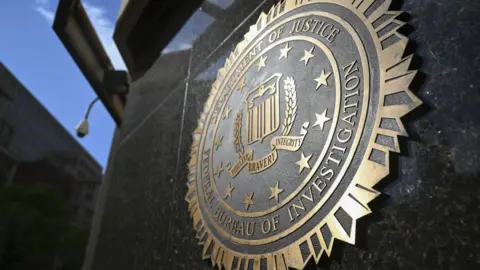FBI investigates racist text messages sent to black people across US
 Getty Images
Getty ImagesAuthorities are investigating racist text messages sent to black Americans across the country telling them to report to a plantation "to pick cotton".
Black Americans, including school and college students, were among the recipients in states including Alabama, North Carolina, Virginia, New York and Pennsylvania.
“The FBI is aware of the offensive and racist text messages sent to individuals around the country and is in contact with the Justice Department and other federal authorities on the matter,” the agency said.
The messages appear to have started on Wednesday, the day after election day. Some of the messages mentioned the Trump campaign – which strongly denied any connection.
Steven Cheung, a campaign spokesman, said: “The campaign has absolutely nothing to do with these text messages.”
The source of the anonymous messages and the total number sent are unclear.
A 42-year-old mother in Indiana sent a copy of the texts her high-school-aged daughter received to the BBC.
The messages said that the daughter had "been selected to become a slave at your nearest plantation" and would be "picked up in a white van" and "searched thoroughly once you’ve reached your destination".
The woman, who asked to remain anonymous for her safety, called the messages “extremely, extremely alarming” and made her feel "really vulnerable".
“It’s because of America’s history, but the timing is specific to the day after the election,” she said. “This had to be a strategised effort.”
Another recipient, Hailey Welch, told a University of Alabama student newspaper that several students on the campus had also received the messages.
“At first I thought it was a joke, but everyone else was getting them. People were texting, posting on their stories, saying they got them,” Ms Welch told The Crimson White. “I was just stressed out, and I was scared because I didn’t know what was happening.”
The wording of the messages varied but generally instructed recipients to report to a “plantation” or wait to be picked up in a van, and referred to “slave” labour.
The texts were sent from numbers with area codes in at least 25 different states, according to CBS News, the BBC's partner network in the US.
TextNow, a mobile provider that allows people to create phone numbers for free, said it found one or more of its accounts were used to send text messages "in violation of its terms of service". The company disabled the accounts within an hour of discovering the misuse, it said in a statement.
"We do not condone the use of our service to send harassing or spam messages and will work with the authorities to prevent these individuals from doing so in the future," it said.
Civil rights group NAACP condemned the messages saying they were a consequence of President-elect Trump’s election.
"These actions are not normal, ” said the group's chief executive Derrick Johnson. “These messages represent an alarming increase in vile and abhorrent rhetoric from racist groups across the country, who now feel emboldened to spread hate and stoke the flames of fear that many of us are feeling after Tuesday's election results.”
Jessica Rosenworcel, chairwoman of the Federal Communications Commission, which is also investigating the messages, said: "These messages are unacceptable. We take this type of targeting very seriously.”
In several states, top law enforcement officials said they were aware of the messages and encouraged residents to report them to the authorities if they received them.
The office of Nevada’s attorney general said it was working to “probe into the source of what appear to be robotext messages”.
In a statement, Louisiana Attorney General Liz Murrill said Louisiana Bureau of Investigation officers had traced some of the messages to a virtual private network – a method of masking the origins of electronic communications – based in Poland.
Murrill said investigators “have found no original source - meaning they could have originated from any bad actor state in the region or the world”.
The Indiana mother responded to reports the messages could have originated abroad, telling the BBC: “It doesn't make it any safer or better that it could have been foreign.”
“They know the mindset of America,” she said.
